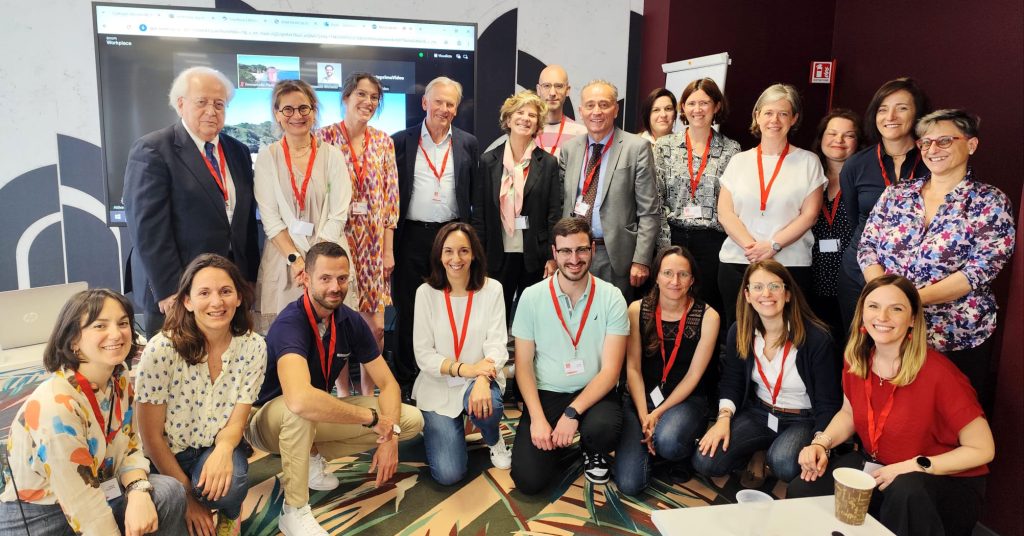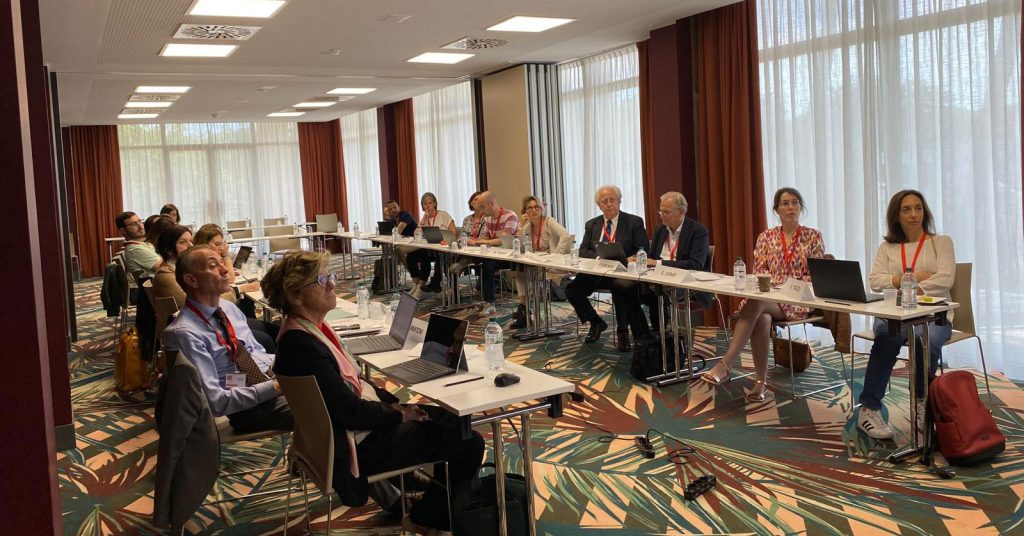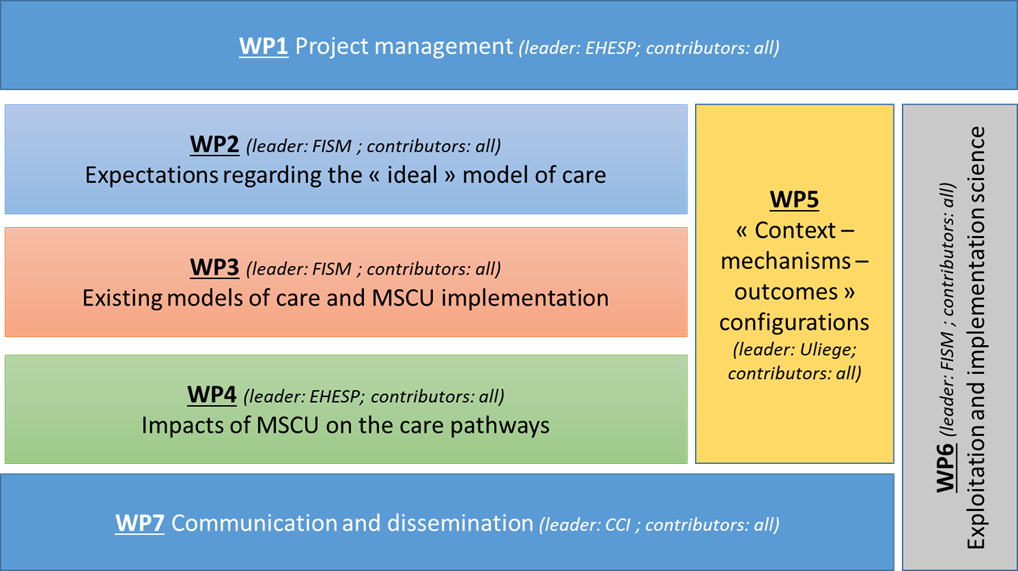News
The kick-off meeting of Musicalise project has been held in Rome, Italy on 26th May 2025.
- Consortium
- Aim
- Context
- Our vision
- What are the gaps in the current knowledge?
- Methodology
- Expected impacts
- Contact
Funding: Transforming Health and Care Systems (THCS) call for proposals (HORIZON-HLTH-2022-CARE-10-01)
Starting date: May 2024
Duration: 36 months (extended by 12 months due to delayed start)
Keywords: multiple sclerosis, integrated care, MS care unit, gradation of care, mixed methods, patient engagement
The project is coordinated by Emmanuelle Leray who is Inserm researcher in EHESP and head of the U1309 research unit “Health services research and management”.
Consortium
Programme Coordinator
- EHESP, France

Partners
- Casa di Cura Igea s.p.a., Italy
- Assistance Publique Hôpitaux de Paris, Pitié Salpêtrière, France
- Société francophone de la sclérose en plaques, France
- Université de Liège, Belgium
- Fondazione Italiana Sclerosi Multipla FISM Ente del Terzo Settore/ETS, Italy

Key Collaborator
- European Charcot Foundation, Belgium

The consortium gathers different kinds of expertise:
- Strong expertise in MS research: consortium members have an outstanding expertise in the field of MS and are internationally recognized experts;
- Expertise in the analysis of health systems and integrated care, including analysis of health care trajectories within clinical and administrative data and assessment of care coordination;
- Extensive training and expertise in qualitative and quantitative methods;
- Expertise in managing multistakeholder research initiatives, patients’ engagement in research and multidimensional research impact assessment.
The Italian and French MS Foundations (FISM and SFSEP) make the bridge between neurologists, people with MS and health care government agencies. In their country, in close collaboration with patients’ associations, each foundation advocates and campaigns to raise public awareness and understanding of MS by uniting the national MS movement for the interests and rights of people affected by MS.
In addition, as coordinator of the EU Responsible Research Innovation H2020 MULTI-ACT project, FISM led the development of a new research participatory research governance model and guidelines to engage patients as key stakeholder in multistakeholder research initiatives (http://www.multiact.eu/).
The European Charcot Foundation is a key collaborator in the project as this international organization dedicated to MS brings together hundreds of MS experts and researchers. In addition. ECF launched the Multi-Stakeholder Initiatives which promotes a joint approach to coordinate existing Multiple Sclerosis initiatives aiming to avoid overlap in the actions and to increase the power of representation of the MS world at institutional level in Europe with the ultimate goal of improving MS patients’ lives. Thanks to its international recognition and action, it offers the opportunity for MUSICALISE to reach larger audience in Europe and in the world.
Through inclusion of AP-HP, the project will benefit from the large experience of FCRIN4MS in conducting multicentric research projects in MS.
ULiège (Public Health) provides a strong expertise regarding integrated care evaluation and realist evaluation approaches and methods to the consortium. Thanks to previous and current research and evaluation projects, the scientific team at ULiège has a strong experience in mixed-method design, policy analysis and organisational features of the healthcare system.
Aim
MUSICALISE aims to develop the highest possible leading-edge interdisciplinary care model for people with MS, that will be relevant to all stakeholders and declinable to different local contexts with the ultimate goal of ensuring the highest level of quality of care in MS.
Context
Multiple Sclerosis (MS) is a chronic lifelong neurological disease starting in young adulthood with diverse symptoms and unpredictable evolution, affecting 2.8 million people. MS care involves a complex blend of health and social care and expertise. Consequently, it necessitates a high degree of coordination to guarantee continuity of care and to fulfill as much as possible specific and always evolving patients’ needs.
In this context, the development of MS care units (MSCUs) gathering a multidisciplinary team of MS-experts in a single place, has progressively emerged, with the aim to offer seamless, efficient and personalized care to people with MS. Through a simultaneous access to multiple areas of expertise, MSCUs should be able to provide the “right care, in the right place, at the right time” to people with MS. This organisational innovation offers the opportunity to avoid care fragmentation, develop a personalised and integrated approach to MS care, which contribute to improved quality of care and better patient outcomes. Indeed, care integration aims to get a simultaneous focus on improving population health, patient experience, healthcare providers’ work experience and health equity, and reducing costs.
Our vision
MUSICALISE intends to bring new perspectives in MS care management and will formulate recommendations that could be relevant throughout EU member states facing similar challenges. Through a co-construction strategy, MUSICALISE aims to propose a sustainable concept of care and a personalized approach, built upon benefits and impacts that are meaningful for all the stakeholders. This will thus provide health care authorities and policy makers evidence-based strategies supporting the transformation towards people- engagement services validated by end-users themselves. MUSICALISE will first benefit people affected with MS but may also stimulate innovations in the management of other chronic diseases which, like MS, require coordination of multiple actors.
MUSICALISE will involve researchers, health care professionals and people affected by MS. We will give equal weights to every stakeholder, meaning that people with MS will also be engaged from the design of the project to the analysis of the results.
What are the gaps in the current knowledge?
MSCU is an organizational innovation, proposed several years ago and on the rise, aiming at providing MS-expert care and support and which is expected to improve experiences from both patients and health care providers. In that perspective, it should also contribute to releasing the pressure on care facilities and improve the overall quality of care through a better distribution of roles and times thanks to care integration. Despite their increased implementation, the evaluation of MSCU as a new model of care is missing. Indeed, to date, very little is known about the organisation behind the concept and its impact on disease management, as measured and felt by people with MS, health care providers (in and out MSCU) and health authorities, as well as its sustainability.
In that context, MUSICALISE will help to better understand what is covered by the MSCU concept and what its impacts are in terms of quality of care and care integration. Case studies will be performed in France and Italy, as these two countries have implemented MSCU in different ways. Indeed, the French Ministry of Health has chosen to label regional MS-expert centers, i.e. 23 over the French territory to answer potential needs of about 130,000 patients with MS. In Italy, a different strategy was operated with more than 240 MS centres across the country and around 87% of people with MS (of about 137,000) receive care in these centres. Such choices imply differential use of MSCU, and possibly differential impacts, which will be assessed and measured in the present project. In-depth analysis will be performed in these two pilot countries, with comparisons both between and within countries. In addition, the European Charcot Foundation, collaborator in this project, is currently performing an international survey on MSCU and their implementation in different countries. The data gathered with this survey will be made available to us and will reinforce our understanding on how MS care is delivered and received in different contexts and different countries. This additional data provision will allow us to extend the analysis and leverage our propositions. Thus, MUSICALISE will take advantage of the transnational collaboration to address the impact of local conditions and political choices regarding care organization for MS.
Methodology
The project’s methodology fits with the realist evaluation paradigm and is based upon mixed methods (combination of qualitative and quantitative methods) in an interdisciplinary approach (epidemiology, political and management sciences). The project will rely on insights from multiple stakeholders (including but not limited to people affected by MS, health care providers, policy makers) and will put emphasis on co-construction.
Results will leverage from data that will be collected via several support (online questionnaire, semi-structured interviews and focus groups). Data collection will focus on existing models of MS care, perceptions of persons with MS and that of health care providers regarding the ideal models of care, patient-reported outcomes and experiences of care, and conditions to promote care integration.
Quality of care is complex to assess as it involves multiple determinants linked to people themselves, professional practices, interactions between stakeholders, system organization… That’s the reason why MUSICALISE requires a co-constructed multidimensional approach.
- The MUSICALISE project is structured into 7 work packages (WP)
Expected impacts
Overall, findings from MUSICALISE have a strong potential to transform MS management, first in participating countries (France and Italy) but also in other European countries, as well as in the rest of the world. We will focus on how MSCU can contribute to care integration for people with MS, and thus prevent care discontinuities, and ensure the delivery of the “right care, in the right place, at the right time”, i.e. appropriate care. Such an approach relies on a quintuple aim, i.e., get a simultaneous focus on improving population health, improving patient experience, reducing costs, improving healthcare providers’ work experience and health equity. Our research project will provide evidence-based strategies to translate innovation into health care systems. Through a co-constructed approach, we aim to propose to health care authorities and policy makers adapted sustainable concepts of care and personalized approaches, based upon benefits and impacts that are meaningful for all the stakeholders. It is plausible that roles of health care providers would need to be redesigned based on our findings and propositions. The proposition of a new way to manage MS based upon graduation of care and referral to MSCU when there is a real need for expert care should lead to a better role distribution between neurologists (MS-expert and not MS-expert). Moreover, the need for a holistic but personalized management of MS seems largely accepted by neurologists in the recent period but is not always done or feasible. We expect that our project will reinforce it by highlighting the need for interdisciplinary care for people with MS, and making sure that all stakeholders will be convinced of the strengths of interdisciplinary teams involving physiotherapists, rehabilitation doctors, neuropsychologists, ophtalmologists… MUSICALISE will provide the assessment of conditions needed to succeed in reaching care integration. And for the first time, the propositions will include perspectives, experiences and expectations from people affected by MS as the same level as those from health care professionals.
To conclude, MUSICALISE will produce and disseminate new knowledge about an organisational innovation that has the potential to transform care delivery and develop care integration for people living with MS. More than a simple assessment, our approach based upon the realist evaluation framework and patient engagement will develop the causal mechanisms that explain how this innovation works and under which circumstances it works best for the patients.
Contact
Emmanuelle LERAY
Programme coordinator of MUSICALISE
Inserm researcher in EHESP and head of the U1309 research unit “Health services research and management”.





